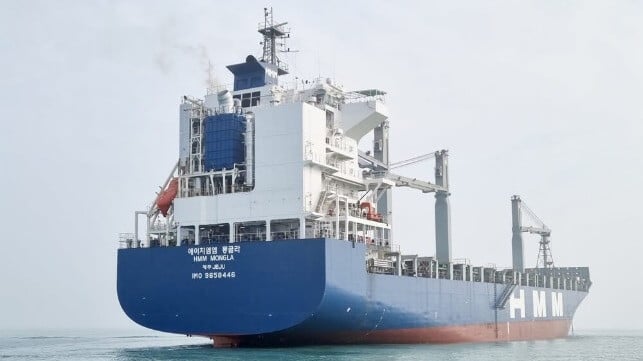Test of Onboard Carbon Capture on HMM Feeder Proves System Feasibility

A year of testing has proven the effectiveness and commercialization potential of onboard carbon capture and storage systems (OCCS), reports Samsung Heavy Industries. In partnership with HMM, Panasia, and the Korean Register of Shipping, they have been conducting tests aboard an HMM feeder vessel operating in Asia.
Samsung Heavy Industries installed an amine absorption-based capture system aboard the HMM Mongla. The vessel, which was built in 2014 and acquired by HMM in 2023, is a 25,000-dwt feeder with a capacity for 2,200 TEU. Measuring 186 meters (610 feet), the vessel was built in China with conventional propulsion and retrofitted with the OCCS system. It operates a feeder loop calling at Ningbo and Shanghai in China, Chattogram in Bangladesh, Port Klang in Malaysia, and Singapore.
According to Samsung, the demonstration attempted to produce results that could verify the effectiveness and commercial potential of the system. In January of this year and again in May, they were able to offload liquified CO2 with a purity of over 99.9 percent. It was used as a raw material for the process of making eco-friendly methanol that could be used as marine fuel. They report it demonstrated a meaningful case of carbon utilization beyond underground storage of the liquified CO2.
“OCCS will play an important role in the net-zero of ships in the future as it is used as an energy source to produce eco-friendly fuel,” said Lee Dong-yeon, Vice President and Director of Samsung Heavy Industries Shipbuilding & Marine Research Institute. “We will work to ensure that the shipbuilding, shipping, and equipment industries can take the lead in the OCCS market through collaboration.”
Panasia, a Korea-based marine parts manufacturer, worked with HMM in the first phase of the program, starting in late 2022, to conduct a feasibility study along with an economic analysis and risk assessment, and explore the handling process for captured CO2. Panasia and Samsung Heavy Industries also provided engineering support for the test.
It is the latest in a series of projects testing the application of onboard carbon capture. Once thought to be a less likely option for vessels, it has shown potential as a means to address the challenges for the industry. It can also be used, as in this case, for retrofitting to extend the commercial life of in-service vessels.
Samsung highlights that the industry is raising the opinion that in order to promote the commercialization of OCCS, it is urgent to establish related laws and systems. It notes the need to develop infrastructure, such as building on-shore systems for processing the CO2, and the rules governing the implementation of the systems on ships.
